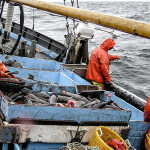The authors of a report on toxin levels in whales grossly overstated the potential impact of their findings on the global seafood supply. But the study, initially picked up by the Associated Press, hasn’t caused much of a stir in the mainstream media since its release late last week.
The report found high levels of aluminum, cadmium, chromium, lead, mercury, silver and titanium in tissue samples taken from nearly 1,000 sperm whales worldwide over five years. But no samples were taken from commercially available fish species such as tuna or swordfish.
Still, Roger Payne, founder and president of Ocean Alliance, which produced the report, was quoted by the AP as saying, “These contaminants … are threatening the human food supply. You could make a fairly tight argument to say that it is the single greatest health threat that has even faced the human species. I suspect this will shorten lives, if it turns out that this is what’s going on.”
National Fisheries Institute spokesman Gavin Gibbons called the quote an “overstatement of biblical proportions.”
“I’m just not sure that kind of rhetoric passes the straight-face test when you’re talking about whale toxicology,” he said.
Additionally, the AP story lead readers to perceive that the study was about human health. “The findings spell danger not only for marine life but for the millions of humans who depend on seafood,” read the lead.
“I wish the [AP] reporter would have been more thorough,” said Gibbons, “but we’ve certainly seen worse.”
ABC News, CBS News and The Huffington Post are a few of the mainstream media outlets that reran the AP story. The Huffington Post posted the headline “Toxins Found in Whales Will Affect Humans,” while CBS News gave a more accurate portrayal of the study with the headline “Whales Threatened by Toxic Metals in the Water.”
Could the report’s limited coverage be a sign that journalists are being more thorough about what they cover when it comes to seafood-related subjects?
Gibbons thinks it’s a possibility, but says the mainstream media’s approach to seafood could still use improvement.
“We would have preferred that the [AP] reporter ask more questions and make those that he was talking to tie it to human health,” he said. “Instead they make broad statements like the fact that this affects a billion people. We’re talking about whale meat.”
All Commentaries >




